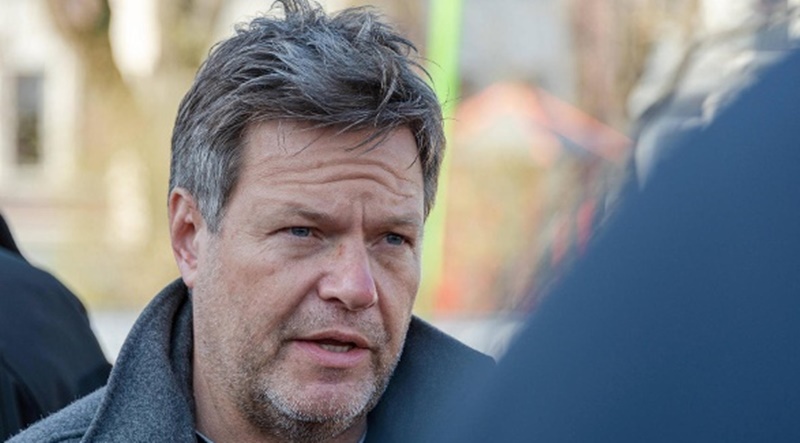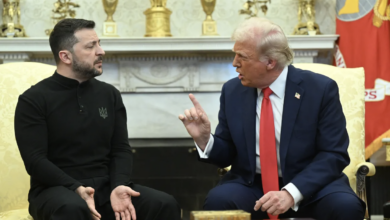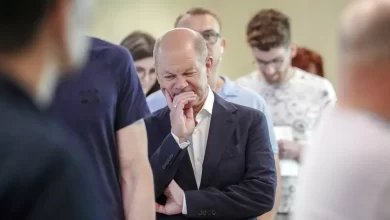For peace and disarmament: The traditional Easter marches also take place nationwide on Holy Saturday. Vice Chancellor Habeck sends warning words to the demonstrators: pacifism is currently “a distant dream”.
Accompanied by criticism and overshadowed by the Russian war of aggression against Ukraine, the traditional Easter marches for peace and disarmament started in Germany over the Easter holidays. Vice Chancellor Robert Habeck (Greens) called on those involved to send a clear message to Russia. “Peace can and will only come if Putin stops his war of aggression,” said the economics minister to the Funke media group.
“So the Easter marches should make it clear that they are aimed against Putin’s war,” Habeck demanded. “Pacifism is a distant dream at the moment,” he said. War crimes are “obviously part” of Russian warfare.
Therefore, for him it is currently “that watching is the bigger fault,” the Vice Chancellor warned of support for Ukraine. It is “clear who is attacking in this war and who is defending themselves in dire need and who we have to support – also with weapons”.
Holy Saturday is the highlight of Easter marches
The Easter marches for peace have a long tradition. Beginning in the 1960s, they at times had hundreds of thousands of participants. Actions were also planned in numerous cities and regions this year, from vigils to marches lasting several days.
The organizing network Peace Cooperative spoke on Saturday of a successful start of the Easter marches, mostly on Good Friday, and occasionally on Thursday. With over 70 events and campaigns, Holy Saturday is the highlight of the Easter March activities. “In many cities such as Berlin, Bremen, Goettingen, Leipzig, Munich, Muenster, Rostock, Stuttgart or Wiesbaden, people are taking to the streets to campaign for peace and disarmament,” it said in a statement.
Calls for demos differ significantly
The Peace Cooperative Network also condemned “Russia’s brutal war of aggression against Ukraine, which violates international law.” However, in some of the calls, some of which differ significantly from one another, “permanent rearmament” in the West and “political failure” there are made jointly responsible for the military escalation.
Therefore, it must now be a matter of “breaking the spiral of escalation,” it said. Competing events with different orientations were announced in Berlin.
Thierse: Motto shows arrogance towards Ukrainians
With a view to the Easter marches, former Bundestag President Wolfgang Thierse (SPD) emphasized Ukraine’s right to self-defence. The motto “Creating peace without weapons” is currently an arrogance towards the people in Ukraine, Thierse told Bayerischer Rundfunk.
FDP politician Alexander Graf Lambsdorff had criticized the Easter marchers, whom he accused of relativising Russian actions and the associated war crimes, as the “fifth column” of Russian ruler Vladimir Putin.
Käßmann defends actions
The former EKD Council President Margot Käßmann, on the other hand, defended the actions. It is not fair to accuse people who have been working for peace for decades of being on the side of Russia, she said on Saturday on NDR. Käßmann warned of an escalation of the war, also through Western arms deliveries to Ukraine.
There are also protests apart from the traditional peace demonstrations: in Berlin, three Russian anti-war activists said they began an indefinite hunger strike in front of the Russian embassy on Good Friday to protest against the war of aggression.
“We remain outside the Russian embassy day and night to demand the withdrawal of all Russian troops from Ukraine and a trial for all war criminals, including the illegitimate President Putin,” said one of the participants, Polina Kwiatkovska, who recently fled Russia is.

 Donald Trump says Zelensky ‘come back when he is ready for Peace’
Donald Trump says Zelensky ‘come back when he is ready for Peace’ German elections and why this vote is important
German elections and why this vote is important Turkey Arrests Three Opposition Journalists
Turkey Arrests Three Opposition Journalists The Royal Mile is becoming increasingly dangerous
The Royal Mile is becoming increasingly dangerous